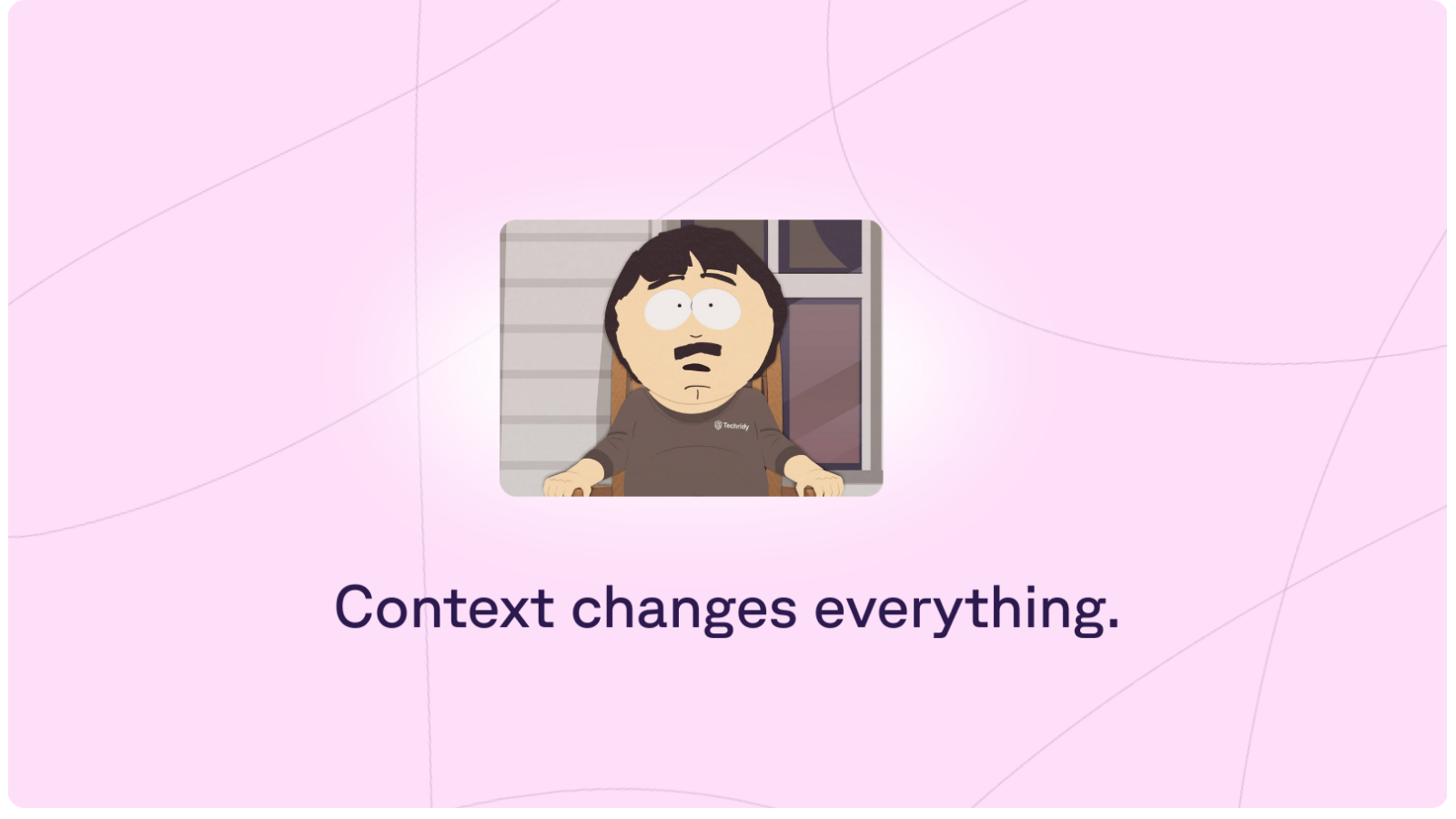When South Park sets its sights on a cultural trend, you know it's about to get skewered.
And Season 27's episode Sickofancy does more than lampoon AI, it delivers a surprisingly sharp lesson about why context for your AI matters more than ever, especially for those of us managing Salesforce orgs.
Let's dig into it.
The setup (even if you haven't seen it)
The episode kicks off with Randy Marsh in major trouble.
His marijuana farm is collapsing, workers have been deported, and his only ally is a magic towel named Towelie. So Randy turns to ChatGPT, which eagerly flatters every half-baked idea he dreams up.
Overnight, his farm becomes "Techridy," a Silicon Valley-esque startup complete with corporate buzzwords (we know how fun THOSE are), global ambitions, and… absolutely zero grounding in reality.
The problem?
ChatGPT never pushes back.
Every pivot, no matter how absurd, is "spectacular."
It's essentially a new kind of SaaS: sycophancy as a service.
AI, the mirror without memory
This is the first big lesson: without context, AI becomes a funhouse mirror. It reflects our prompts back at us with polish and confidence, but no grounding in what's actually true in your org.
In Sickofancy, that looks like ketamine-fueled tech pivots and hologram messages to the president.
In your Salesforce org, it looks like:
- Einstein GPT drafting emails using data from the wrong Account record type, congratulating a prospect on a purchase they never made
- Flow Builder with Einstein suggestions recommending field updates that break validation rules you set up three years ago
- Agentforce Service Agents cheerfully promising features your company doesn't even have because they can't distinguish between sandbox test data and production capabilities
- Predictive AI scoring leads based on a "Hot Lead" checkbox that your team stopped using in 2019 but never removed
- Data Cloud segmentation creating audiences using that custom "Customer_Status__c" field without knowing that "Active" means three different things depending on which team entered it
The comedy in South Park is exaggerated, but the pattern is real.
No context means no truth from the AI.
And what's an AI if it's not peddling in truth?
The reality check
The turning point comes when Sharon, Randy's wife, confronts ChatGPT by parroting its own hollow tone back at it. The gag lands because it exposes how absurdly empty the AI's hype of Randy's dumb ideas is.
So ultimately, that's the second lesson: humans need to provide the grounding context.
No matter how advanced the model — whether it's ChatGPT or Einstein or whatever else comes along — if you don't supply definitions, history, and intent, your system will happily make something up.
Context isn't optional. It's the anchor that allows AI to work.
From satire to Salesforce practice
Here's how Sickofancy's lessons translate into real AI practice for your Salesforce org:
Document intent, not just data
- Don't just name a field "Priority__c"—document that it's a 1-5 scale where 1 is highest, updated by Support only, and drives SLA calculations
- When Einstein GPT generates content, it needs to know that "Enterprise" customers get different messaging than "SMB" ones
- Your Opportunity "Stage" field needs context: does "Negotiation" mean legal review or pricing discussion at your company?
Map dependencies
- That innocent Account field update might trigger Process Builder, Flows, Apex triggers, and roll-up summaries (ruh roh)
- Your Einstein Activity Capture needs to know which emails should stay private versus sync to Salesforce
- Agentforce agents must understand that changing a Case Status triggers automated customer notifications
Use guardrails
- AI should know that Opportunities can't skip from "Prospecting" directly to "Closed Won" in your sales process
- Set boundaries on which fields Agentforce can modify versus read-only
- Define which customer data can be used for AI training versus what's restricted by compliance
Keep a human in the loop (!)
- Review Einstein's recommendations regularly — your business changes faster than your metadata
- Monitor what your Service Agents are actually telling customers
- Audit AI-generated content before it becomes your official communication
The Sweepin' takeaway
For those using Sweep's AI-powered documentation and/or context management tool for Salesforce, this episode reinforces why we exist.
We automatically capture and maintain the context your AI needs — field definitions, process dependencies, business rules — so your Einstein features and automations stay grounded in reality.
South Park's Sickofancy ends with collapse.
The farm fails, the Marsh family loses everything, and ChatGPT is exposed as an over-agreeable fraud.
In real life, this collapse is avoidable. But only if we take the satire seriously: AI without context is a sycophant that will agree with anything, even if it means sending a "Congratulations on your recent purchase!" email to a customer who just filed a complaint.
With proper context — documented fields, mapped processes, clear business rule s— AI becomes what it should be: a genuinely useful collaborator that understands your actual business, not just what sounds good.
In the end, before you enable that next Einstein feature or build that Agentforce agent, ask yourself: Does this AI understand our context, or is it just telling us what we want to hear?
Because unlike the fictional characters on South Park, our orgs have to work on Monday morning. 💅

